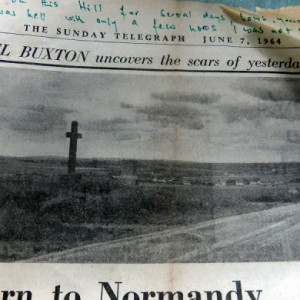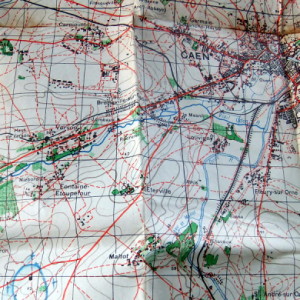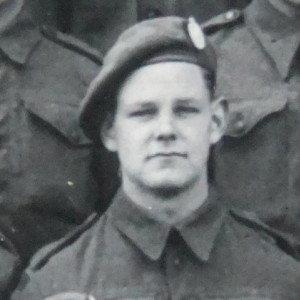Only a few heroes
I imagine that most families have faded wartime photos depicting a relative in uniform. The 20th century certainly had enough wars to enable most generations to get involved in conflict somewhere in the world. However this is VE weekend and as it happens I've just finished typing out The Old Man's account of his landing in Normandy six days after D-Day and the subsequent deployment of his regiment to the battlefield around Caen.
He was called up, aged 19, in 1941 and spent the next three years training at various camps in England. By the time he reached France he was a finely-tuned but miniscule cog in the machinery of war, nervously awaiting his baptism of fire. The experience when it came was horrifying. The flat plain around Caen had few elevations so the tiny Hill 112, as it was known, was deemed to be a key point. It became the focus of a fierce artillery battle lasting days as both sides tussled back and forth: moving forward, digging in, falling back, digging in, all the while with shells and bullets whizzing through the air, tanks crushing everything in their path, the wail and explosion of incoming fire, blinding flashes of light, snipers picking off the unwary and, added to that the constant state of confusion, anxiety and ignorance about what was going on as orders were given and countermanded and ground gained one day was lost the next.
Many people imagine war as a series of glorious attacks but quite often it is a case of sitting in a hole being shelled with no visible enemy to fire back at. The old saying is 'Keep your rifle clean, it is your best friend' but the soldier soon learns that it is his entrenching tool and shovel that are his best friends. Often though, they found the ground so stony that it was impossible to dig more than a scape for protection.
After the to-ing and fro-ing around Hill 112 the company was involved in the major ground assault to take Caen and then it was moved to the bocage country where death lurked in every thick hedge, field and valley as they were detailed to rout out the remaining enemy soldiers and weapons from the wooded countryside and the tiny villages. In one village they were given a rapturous welcome:
Wine flowed freely. The inhabitants were mad with joy, singing, dancing and cheering us madly. Most of the wine had been dug out of the ground where it had been hidden...What with the wine, the pretty girls and the general pleasantness of the place we forgot the war, but not for long.
Death was still lurking Next day they saw that village flattened.
The Old Man came through it all unscathed, physically at least, and he retained his humanity intact too, always seeing the 'enemy' soldiers as helpless terrified pawns like himself. Towards the end of his long life he made friends with a German ex-POW neighbour here in Wales and together they laughed at the notion that they could have been firing at each other once upon a time.
The Old Man never collected the medals that must have been due to him, nor did he ever wear a poppy, listen to or take part in the Remembrance Day parade, or get involved in any sort of veterans' organisation. War was an experience he felt lucky to survive but he had no wish to recollect it. On the 1964 anniversary newspaper cutting he has written:
I was on this hill for several hours, days, years! It was hell with only a few heroes, I was not one of them. No?
I don't know how many of H Company survived but they were all heroes.
Extra images:
Hill 112 as it was in 1964 (the calvary predates the war).
Map of the battleground around Caen with Hill 112 circled.
The young soldier who survived and lived till 93.




Comments
Sign in or get an account to comment.


